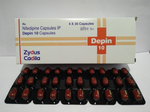angiblock
Introduction to Angiblock
Angiblock is a widely used medication designed to help manage cardiovascular conditions, particularly hypertension and angina. With its active ingredient, Nifedipine, Angiblock works by relaxing blood vessels, allowing blood to flow more easily and reducing the workload on the heart. This medication is available in various forms, including tablets, capsules, and sometimes as an injection or syrup, making it versatile for different patient needs. Angiblock is prescribed by healthcare professionals to ensure optimal heart health and improve patients' quality of life. Please consult your doctor to determine the best form and dosage for your condition.
Composition of Angiblock
The primary active ingredient in Angiblock is Nifedipine, which is a calcium channel blocker. Nifedipine works by inhibiting the influx of calcium ions into cardiac and smooth muscle cells. This action helps to relax and widen blood vessels, leading to lower blood pressure and reduced chest pain associated with angina. By decreasing the heart's workload, Nifedipine effectively manages symptoms and improves cardiovascular health. The 10mg dosage is carefully calibrated to provide therapeutic benefits while minimizing potential side effects.
Uses for Angiblock
- Management of hypertension (high blood pressure)
- Treatment of chronic stable angina (chest pain)
- Prevention of certain types of heart attacks
- Improvement of blood flow in patients with Raynaud's phenomenon
Side Effects of Angiblock
- Headache
- Dizziness or lightheadedness
- Flushing
- Swelling of the ankles or feet
- Fatigue
- Nausea
- Shortness of breath
- Rapid heartbeat
Precautions of Angiblock
Before taking Angiblock, it's essential to inform your healthcare provider about any existing medical conditions, allergies, or medications you are currently taking. Patients with a history of heart failure, liver disease, or kidney problems should exercise caution. Pregnant or breastfeeding women should only use Angiblock if clearly needed and prescribed by a doctor. Avoid consuming grapefruit or grapefruit juice while taking this medication, as it can increase the risk of side effects. Regular monitoring of blood pressure and heart rate is advised to ensure the medication's effectiveness and safety.
Conclusion
Angiblock, with its active ingredient Nifedipine, is a reliable medication for managing hypertension and angina. Available in tablets, capsules, and potentially as an injection or syrup, it offers flexibility in treatment options. While effective, it is crucial to use Angiblock under medical supervision to minimize side effects and ensure optimal results. Always follow your healthcare provider's guidance and report any adverse reactions promptly. By doing so, Angiblock can significantly contribute to improved cardiovascular health and overall well-being.
Similar Medicines
Available in 3 variations

Angiblock 10mg Capsule
Angiblock 10mg Capsule
strip of 30 capsules

Angiblock 5mg Capsule
Angiblock 5mg Capsule
strip of 30 capsules

Angiblock Retard 20mg Tablet
Angiblock Retard 20mg Tablet
strip of 10 tablets
Related Faqs

Do I need to change my diet while taking Nicardia?
Yes, making small changes to your diet can help your medicine work better. You must take a low sodium and low-fat diet, and adhere to the lifestyle changes as advised by your doctor. You should also avoid eating grapefruit (chakotra) or drinking grapefruit juice while taking Nicardia.

Can Depin be used in pregnancy and nursing mothers?
It is advised that you should consult your doctor before taking this medicine if you are pregnant, planning to become pregnant or breastfeeding. It should be used only if prescribed by the doctor in case of pregnancy. Studies have shown significant risks to the developing baby and it is given only if the benefits are clearly more than the risks involved.

Can Nifcard be used in pregnancy and nursing mothers?
It is advised that you should consult your doctor before taking this medicine if you are pregnant, planning to become pregnant or breastfeeding. It should be used only if prescribed by the doctor in case of pregnancy. Studies have shown significant risks to the developing baby and it is given only if the benefits are clearly more than the risks involved.

Is Angiblock a diuretic?
No, Angiblock is not a diuretic medication. However, some evidence indicates that Angiblock has a partial diuretic property which may result in increased sodium loss through urine. It is a medication which relaxes the blood vessels by directly acting on them. This helps to decrease the blood pressure of the individual. As a result, blood flows more easily and lowers blood pressure, which helps to reduce the strain or pressure on your heart.

Is Cardules a diuretic?
No, Cardules is not a diuretic medication. However, some evidence indicates that Cardules has a partial diuretic property which may result in increased sodium loss through urine. It is a medication which relaxes the blood vessels by directly acting on them. This helps to decrease the blood pressure of the individual. As a result, blood flows more easily and lowers blood pressure, which helps to reduce the strain or pressure on your heart.

Can Angiblock be used in pregnancy and nursing mothers?
It is advised that you should consult your doctor before taking this medicine if you are pregnant, planning to become pregnant or breastfeeding. It should be used only if prescribed by the doctor in case of pregnancy. Studies have shown significant risks to the developing baby and it is given only if the benefits are clearly more than the risks involved.
Related Posts

1:15
Are Your Hormones Out Of Balance? Signs & Symptoms!

1:15
How Do You Know If You Have a Vaginal Infection? Warning Signs!

1:15
Top Health Benefits of Cinnamon | How to Use It for Better Health!

1:15
Is Your Blood Pressure Too Low? What Are the Best Remedies to Fix Low Blood Pressure Instantly?

1:15
Mala D: How it works, When and How to take Mala D and Side Effects of Mala D!
















.svg)
